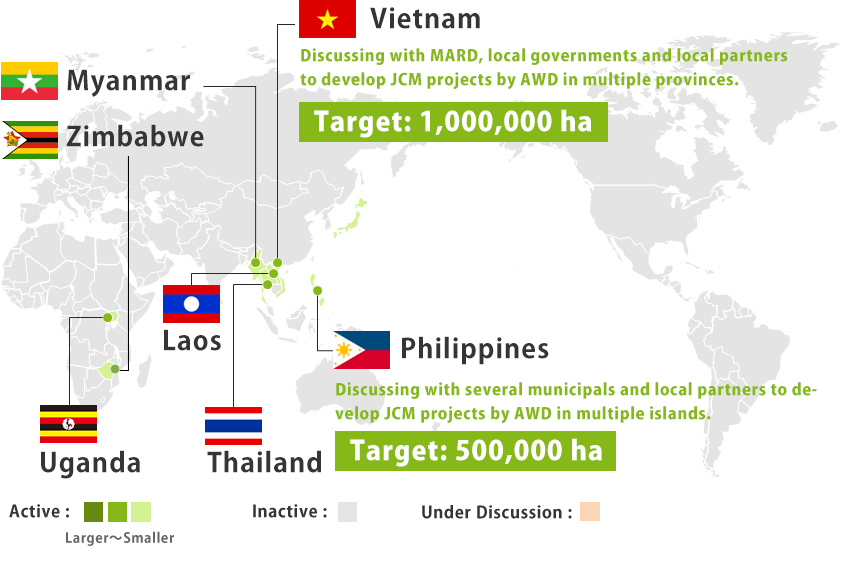Pave the Way to a Sustainable and Fair Tomorrow
ContactFaeger, project developer of decarbonization
project in the agricultural sector
Faeger is a company that collaborates with farmers to generate carbon credits. It is one of the few companies in Japan that can consistently handle everything from the creation to the sale of carbon credits. Faeger provides these credits to business as “credits that show the face of producers committed to decarbonization”, providing value not only through carbon offsets but also in public relations. By supporting the process of credit creation and purchasing, Faeger brings revenue to farmers and promotes activities to reduce CO2 emissions in agriculture.
Service In Asia
Achieving
sustainable agriculture
in Asia through the utilization of carbon credits
We offer a comprehensive solution using carbon credits to achieve sustainable agriculture, and enhance the productivity and profitability of farmers.
News
What we do
We specialize in carbon credits in the agricultural sector, serving as both experts and developers.
From project planning to carbon credit sales, we seamlessly execute the entire process.
01.
Project Planning
02.
Consulting
03.
Project Implementation Structure Establishment
04.
Project Registration,
Document Preparation,
and Application
05.
On-site Management
&
Supervision
06.
Monitoring
&
Analysis
07.
Project Certification Obtainment
08.
Credits Sales
Provision of Sustainable Agriculture Programs
We, as agricultural experts, provide technical guidance and knowledge for decarbonized and conservation agriculture.
Currently Active Methodologies
AWD(Alternate Wetting and Drying)
the Reduction of Methane Emissions from Paddy field through AWD(Alternate Wetting and Drying)
Biochar
Utilization
Biochar Utilization in Soil and Non-Soil Applications
Potential Future Methodologies
Ruminants’
methane reduction
the Reduction of Enteric Methane Emissions from Ruminants through the Use of Feed Ingredients
Farming
N2O reduction
Quantifying N2O Emissions Reductions in Agricultural Crops through Nitrogen Fertilizer Rate Reduction
How we do
We employ two approaches to drive our initiatives forward.
Voluntary Credits Approach
Working with farmers
to generate carbon credits
Supporting carbon credit procurement
and investment for farmers
Farmers
Encouraging decarbonized agriculture.
Applying for voluntary credits.
VCS, Gold Standard, etc.
Fee payments to the farmers.
Selling voluntary credits.
Buyers
JCM Approach
Working with farmers
to generate carbon credits
Supporting carbon credit procurement
and investment for farmers
Farmers
Attracting investment in facilities for decarbonized agriculture.
Encouraging decarbonized agriculture.
Applying for JCM.
Selling JCM.
Bank
Buyers
Why we do
We face challenges that demand resolution.
Climate Change Risks Due to Global Warming
“The era of Earth heating up has arrived.” The continuous rising of Earth’s temperature is intensifying climate change risks, including frequent extreme weather events. In response to these changes, the world is making significant strides towards carbon neutrality. We are actively working to accelerate this movement in Asia.
Need of GHG Reduction in the Agricultural Sector
The primary cause of global warming is GHG emissions. The agricultural sector accounts for approximately 10% of global GHG emissions, and despite global calls for decarbonization in this field, progress has been limited. We aim to promote decarbonization in agriculture by leveraging carbon credits.
We have a track record of achievements.
Within Japan, the largest-scale reduction of methane emissions in rice paddies and carbon credit issuance is expected.
Japan is expected to reduce methane emissions in rice paddies and issue carbon credits at the largest-scale ever.
Estimated Achievements in Japan by 2027
2023
Generative Credit(Achieved)
1,600ha
6,000t-CO2e
【Regions】
14 / 47
provinces
【Cooperative Farmers】
60
units
2024
Generative Credit(Expected)
35,000ha
100,000t-CO2e
【Regions】
39 / 47
provinces
【Cooperative Farmers】
2,000
units
2025
Generative Credit
(Expected)
150,000ha
450,000t-CO2e
【Cooperative
Farmers】
10,000
units
2026
Generative Credit
(Expected)
250,000ha
750,000t-CO2e
【Cooperative
Farmers】
15,000
units
2027
Generative Credit
(Expected)
300,000ha
900,000t-CO2e
【Cooperative
Farmers】
20,000
units
Future overseas expansion prospects

We have a future we want to achieve.
Our Vision
Promote decarbonized agriculture and raise income for farmers through
carbon credits.
Build a network for farmers,
with farmers throughout Asia.
Expand agricultural materials,
technology, and facilities to
increase agricultural yields.
For example
in the case of rice paddies
Irrigation facilities are needed to
create carbon credits from paddy fields.
Irrigation systems enable cultivation
during the dry season
as well as the rainy season.
As a result, yields can be doubled,
increasing farmers’ profits and contributing to solving the world’s food problems.
FAEGER
aims to make it possible
for each person to sustainably produce
their own food
in the next generation.